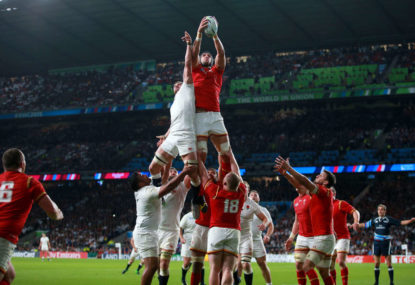There is an oft-repeated saying around the Tour de France, ‘You can’t win the Tour in the first week, but you can lose it.’
This also applies to the Rugby World Cup thanks to the blazing, glorious comet that was the England team bowing out of their own tournament, and the tough opposition provided by the minnows.
Le Tour is a gruelling, three-week test of endurance that, one-by-one, drops contenders from the race as the days and beautiful French countryside pass by, leaving a select few to battle it out in the final mountain stages.
Rare is the rider who can comprehensively blow away the rest of the field early on. Other contenders are still fresh, their teams intact and in formation around them.
Eventually the Tour comes down to man on man, scrambling up some cote or alp where only mountain goats should be found, but that isn’t until later.
But it is possible to lose too much time to make up.
The World Cup is now too hard to expect a problem-free first three weeks for the main contenders. The minnows have improved and are showcasing the strength of rugby as a truly global product, not the domain of a select few empire remnants.
Second-tier teams are much more organised and physical. Professionalism has allowed all nations to produce better athletes and drilled defensive lines to combine with what has always been a strong sense of pride.
Gone are the days of 80-point floggings. Minnows are often within 10 at half-time and sometimes not much further back than that before the great sides finish the game with a strong sail to swing the final outcome further in their favour than the 80 minutes may suggest.
England did about enough against Fiji in the World Cup’s opening match, but I criticised the performance because it showed they had more flaws and deficiencies than the final score indicated.
It was the second week where England really stumbled – previously coming unstuck against a plucky Welsh side. They never should have lost that match, even playing below their best. Wales were missing a number of their first-choice players in the squad to begin the tournament, and by the end of that match their bench resembled a MASH unit more than a professional sporting outfit.
Yet England couldn’t find enough to put them away, and it was the hosts who faltered late.
It’s not crucial for a team to peak in the group stage of the World Cup, you can’t win the tournament in the second week. After losing that match England were still in the hunt, even in a tough group.
Then they were overwhelmed by Australia at Twickenham. Pummelled from scrum to ruck, from backline move to flyhalf swerve. Even what looked like a Nick Phipps special brewing in the second half didn’t give England the mojo they needed.
Suddenly England fans know just how true it is that you can lose the World Cup in the group stage, even if you can’t win it.
Australia and Wales haven’t won the World Cup by progressing – both, especially Australia, have scope and latitude for improvement – but they survived.
Other teams to not lose the World Cup at this stage – i.e. scratch through a game or two, but keep their hopes alive – are South Africa, Ireland, New Zealand, Argentina and Scotland.
All have had their rusty moments, fighting through form and combination issues, with lesser opponents annoyingly hard to overcome. But they are all still here, hanging on for the next round. All they’ve done thus far is manage to not lose the World Cup.
In this year’s Tour de France we all wondered if Chris Froome had that real, proper killer pedal-stroke that he’d shown in previous years. He entered the back half of the tour without really showing it, despite his lead.
Big names like Alberto Contador, Pierre Rolland and Thibaut Pinot were already out of contention by the halfway point. Despite the grind of the early weeks, Froome had given himself time to find his A-game. And find it he did.
Likewise, New Zealand will want to find that extra gear only they have, Argentina will want to be more efficient out wide, Ireland will search for consistency, South Africa for their usually strong platform. All have time to do so.
Another team making sure they haven’t lose the World Cup yet are Japan. The story of the tournament.
They may not win it, but their preparation, tenacity and relentless consistency ensures they are still dreaming of more World Cup glory.
A loss to Samoa would have spelled the end of their dream, despite whatever historic achievements their win against South Africa totalled. But they were unwilling to concede and find themselves still well and truly here.
Michael Cheika’s decision to select two full teams in his Wallabies squad is a plan suited to times when there aren’t simple thrashings that might as well be rest breaks in the pool stage. And coaches would be wise to use his template in future tournaments, where the fringe teams will be stronger again. Having depth to call on for short turnarounds is crucial to the cause.
Despite what the final score suggests, the Japan versus Scotland game was close for more than half, which suggests the Cherry Blossoms may have pushed that outcome into the 80th minute yet again if they possessed the Wallabies’ depth, or more time before that particular fixture.
After the Springboks’ loss to Japan, the South African sports minister said they risked becoming “nothing else but a bunch of losers”.
But the Springboks steadied themselves and held their nerve against Samoa in the following match to make sure they wouldn’t be losers. They are still here.
England, after losing to Wales, couldn’t do the same. The game against Australia was too early to win the World Cup, but the loss ensured they’d be remembered as losers.





























































































